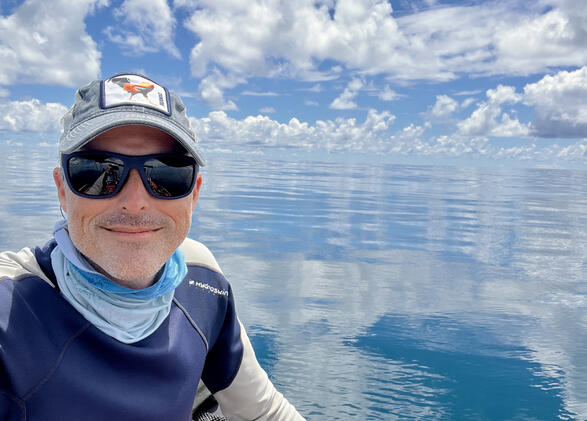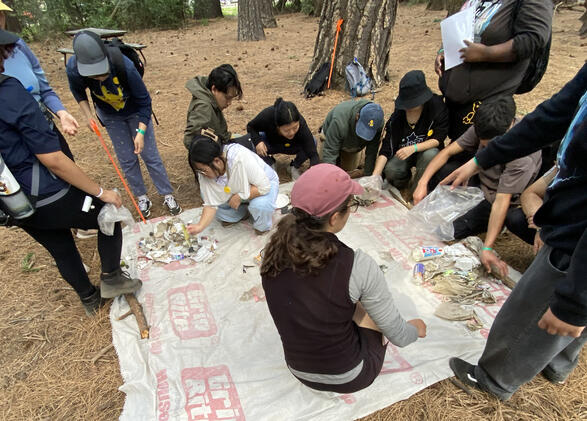Educator Spotlight: Isabel Esparza

Isabel Esparza fearlessly stepped onto a plane in New Jersey destined for Detroit, Michigan. All of the flight attendants paid special attention to Isabel, mostly due to the sticker she wore — a sticker that read, “Unaccompanied Minor.” She was nine years old, and with her mother’s enthusiastic support, she was flying across half the country to be a flower girl at her cousin’s wedding.
“I remember it feeling like a huge adventure!” says Isabel. “I’ve always loved flying since my first flight when I was five years old.”
That first flight came at her mother’s urging, when Isabel traveled with her grandmother and uncle from New Jersey to New Mexico to see the Grand Canyon.
“My parents were both immigrants,” says Isabel. “My mom, particularly, wanted to explore the nature of her new home, and that meant national parks.”
Isabel’s mother was the driving force in her childhood full of outdoor play and exploration. Any time she would claim boredom, her mother would push her to find fun outside. Isabel visited Yellowstone, Grand Teton, Grand Canyon National Park and numerous other natural wonders before she became an adult.
“That [trip to the Grand Canyon] was an epic adventure...especially for a five year old! It was my first time away from my parents, but they felt strongly that I should have the experience.”
Isabel spent two weeks discovering the Grand Canyon with her extended family — its deserts, petrified forests, new wildlife and spectacular vistas. The adventure sparked a lifelong love of nature that eventually led her to work as an educator for NatureBridge’s Mid-Atlantic campus in Prince William Forest.
That [trip to the Grand Canyon] was an epic adventure...especially for a five year old! It was my first time away from my parents, but they felt strongly that I should have the experience.Isabel Esparza, former NatureBridge educator
She recalls the emotional journey of students arriving at the campus in Prince William Forest, many of whom had never been more than an hour away from home before. Long, noisy buses enter the lush forest filled with babbling brooks and Civil War tombstones. The bus doors open and—
“Kids get out screaming at the top of their lungs. Saying ‘ewwwww!’ and stuff like that. They’re worried about getting mud on their sneakers or they’re grossed out by the bugs. It’s so funny and over-the-top dramatic,” she laughs.
The experience inherently presented a challenge for Isabel and the educators: she wanted to give these students what she received from her mother as a child. She wanted them to walk away inspired by and in love with nature, and sometimes that required breaking down mental barriers.
“I used to play this game where I’d ask everyone to imagine a scientist. Visualize a scientist. They’d all come up with the stereotype of what a scientist looks like, with the crazy white hair and a lab coat, and it’s always an old, white man pouring bright chemicals into test tubes. That’s all great and I’m sure that scientist exists, but I would work really hard to make sure every kid left knowing they could be a scientist; that they were worthy of entering a S.T.E.M. field if they wanted.”
As the weekend in Prince William Forest progressed, Isabel saw the drastic transformation in every student; the power of nature and the social-emotional learning led to a response at the end of the trip she grew to know and love: they wanted to stay forever.
“When you educate kids with genuine joy, they see and feel that. They’re welcomed into a space of nonjudgement versus being part of some arduous bootcamp.”
I used to play this game where I’d ask everyone to imagine a scientist. Visualize a scientist. They’d all come up with the stereotype of what a scientist looks like, with the crazy white hair and a lab coat, and it’s always an old, white man pouring bright chemicals into test tubes. That’s all great and I’m sure that scientist exists, but I would work really hard to make sure every kid left knowing they could be a scientist; that they were worthy of entering a S.T.E.M. field if they wanted.Isabel Esparza, former NatureBridge educator
Isabel spent three seasons with NatureBridge before departing in 2016. She’s taken those social-emotional teaching skills into various classrooms over the years, spending time as a teacher’s assistant for ESL (English as a second language) students and now working for a Catholic church, helping families of children prepare for their sacraments.
“My job is to make people feel loved and affirmed. It’s a common theme I’m finding in my career choices,” says Isabel.
She’s thinking about having her own children in the near future and is excited to expose them to the healing power of nature just like her mother did with her. She plans on imbuing their lives with the sense that they can do anything; even get on a plane by themselves. Isabel also dreams of visiting more national parks, with Yosemite being number one on her list.
Will she be sending her future first grader on a solo airplane trip to see Half Dome?
“Maybe! Depends on who’s on the receiving end; who knows! If NatureBridge started doing that kind of thing, then yes. I know they’d be in good hands,” she laughs.
“I mean, I survived.”






